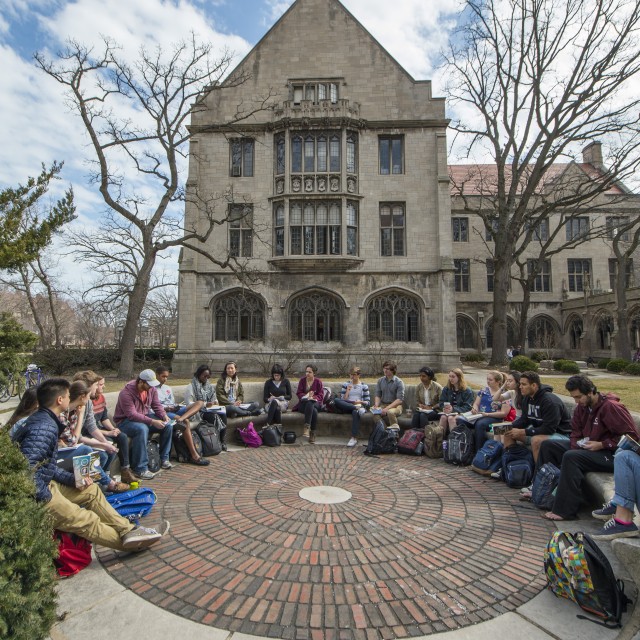
The Core
Humanities Core
Part of every first-year student’s course schedule, the Humanities Core is the foundation of Chicago’s general education curriculum. It is instrumental in facilitating the transition from high school to college by helping students become independent thinkers. In small discussion-based seminars, students learn and practice the art of oral argument and dialogue. The Humanities Core teaches students to read closely, think critically, and write effectively. By engaging with texts and artworks of great complexity and enduring significance, students grapple with the philosophical, literary, and aesthetic questions and issues that underpin the humanities: How do great texts shape us and how does our understanding in turn shape them? What is the nature of language and how does it make us human? How do media inform our perception and representation of the world? What does it mean to think philosophically? These are some of the questions, students discuss when they enter the deep and wide-ranging conversation with faculty and other students that is the Humanities Core.
Quick Links
Humanities Sequences
In this sequence, students examine the relationship between the individual and society in a rich and exciting selection of literary texts from across the globe. Concurrently, they address the challenges faced by readers confronting foreign literatures, reading across time and cultures, and reading texts in translation. The sequence focuses on two major literary themes and genres: Epic Poetry (Autumn Quarter) and Autobiography (Winter Quarter). Students wishing to continue into the Spring Quarter can choose from a selection of topics courses (e.g., “Masters and Slaves,” “Reading Crime Fiction,” “Love and Transformation,” or “Animals and Others.")
In this sequence, students consider philosophy in two lights: as an ongoing series of arguments addressed to certain fundamental questions about the place of human beings in the world and as a historically situated discipline interacting with and responding to developments in other areas of thought and culture. Readings tend to divide between works of philosophy and contemporaneous works of literature, but they may also include texts of scientific, religious, or legal practice.
In this sequence, students learn about the three poetic genres that Aristotle thought most important: Epic, Tragedy and Comedy -- how they were invented by the Greeks and how they were then adapted and reinvented many times, first by the Romans and then by subsequent poets and playwrights from the Renaissance to modern times. Autumn is devoted to epic poetry, beginning with the Iliad and ending with Paradise Lost, in Winter we read a different tragic play each week, beginning with Aeschylus and ending with dramatists like Shakespeare and Racine and in the Spring we turn to Comedy starting with Aristophanes and Plautus and ending with comic playwrights like Shakespeare, Moliere or Kleist.
What does it mean to be an excellent human being and an excellent citizen? This sequence invites students to debate, discuss, and critically examine what it means to be part of a community, and other related matters. Students read and discuss seminal works predominantly of the Western tradition, selected both because they illuminate the central questions and because, read together, they form a compelling record of human inquiry.
In this sequence, students learn the art of close reading through the analysis of objects across a broad range of times and places, from Homer’s Odyssey to contemporary film, from folktales to museums. In the process they explore questions about memory, home, and belonging; the various historical forms of cultural production, from epic to folk tale, music, film, and novels; about the challenges of translation to responsible interpretation; about texts as formative sources of human community, interpersonal obligation, and transcendence; about hybridity and the legacy of colonialism; and, of course, about the role of humanistic inquiry in addressing all these questions.
Students in this sequence study a question central to humanistic inquiry: How do different kinds of media allow us to perceive and represent our world? To answer this question, they study how painting, photography, writing, film, song, and other media have allowed for new forms of knowledge, expression, and experience—but have also been seen as ethically dangerous or politically disruptive. The sequence traces philosophical and aesthetic debates about media from antiquity to the present in various cultural contexts. Students examine discussions of image, text, and sound in Plato, Shakespeare, Nietzsche, W. E. B. Du Bois, Alfred Hitchcock, Toni Morrison, and recent critical theory.
Language is at the center of what it means to be human and is instrumental in all humanistic pursuits. With it, we understand others, persuade, argue, reason, and think. This course aims to provoke critical examination of common assumptions that determine our understanding of language, texts, and the ways language is used and understood via three interconnected processes: power, identity, and thought.
What is poetry and why do we do it? In this three-quarter sequence, students examine the practice of poetry as a form of communication and linguistic innovation, asking questions such as: How is poetry as language and action different from other forms of linguistic activity? What is the role of poetry in society, in regard to memory, storytelling, and history; ritual and magic; knowledge and formation of selfhood; institution and revolution? This course addresses these questions in the poetry of different eras and peoples. In the Spring Quarter, this sequence branches: students may continue into HUMA 18200 or switch into the affiliated Arts Core course CRWR 18200 Poetry and the Human.